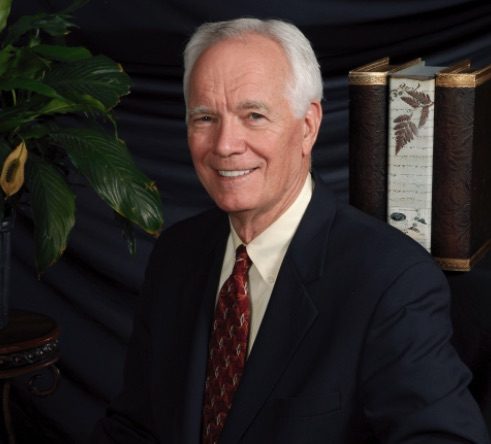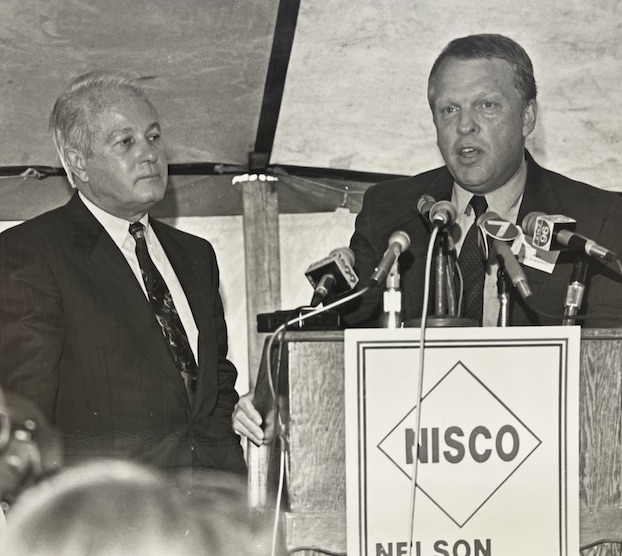Economist: SW La. economic forecast will depend on the election
Published 4:27 pm Wednesday, October 2, 2024

- Loren C. Scott is president and founder of Loren Scott and Associates, a firm that provides economic consulting. He is one of the 32-member National Business Economics Issues Council, which meets quarterly to discuss issues of state, national and international interest. (Special to the American Press)
Economist Loren C. Scott was in Lake Charles at the Southwest Louisiana Entrepreneurial and Economic Development Center SEED Center Tuesday to give his annual forecast – a big-picture, up-close look at Southwest Louisiana. Southwest Louisiana’s economic forecast is “middling,” he said, and will depend on the election.
This time last year, economists — including Scott — were hinting at a recession. At least three leading economic indicators pointed to it.
“Suppose you got a call that said the smoke alarm, a fire alarm and a security alarm were all going off at your house. Would you think there’s a problem?,” he asked.
Trending
The Feds made adjustments to interest rates and the services-money flow.
“And yet look at what’s happened in the economy, especially the last quarter, look at what’s happened to Real Growth Domestic Product (RGDP). It grew 3 percent, which is a very good rate. That’s really good,” Scott said.
Personal consumption spending is one of the four things that makes up the RGDP. In his report distributed to meeting attendees after his presentation, he writes, “It is our belief that consumers were able to maintain their spending behavior despite the higher interest rates and reductions in money supply because they were still able to draw down on the enormous savings created by COVID stimulus monies and enhanced child tax credits.”
Sahm, a new economic indicator
Scott said he thinks the Feds dropped the interest rate 50 basis points instead of a quarter of a percent because of “another little tool out there called the Sahm Rule, discovered by the economist Claudia Sahm.”
She found that if the unemployment rate rises more than 0.5 percentage points above the previous 12-month average, it could signal a recession.
Trending
“Since 1969 this indicator has never sent out a false alarm,” Scott said, “and guess what happened in August? When the Feds saw that, they said, ‘Oh shoot,’ or some variation of that and they said we got this other mandate and that is to keep the economy going.”
After charts were analyzed and numbers tallied, Loren forecasted a soft landing.
Oil and natural gas
The economy of Southwest Louisiana will depend on what happens with fossil fuels, and what happens with fossil fuels — including the chemicals made from them such as contact lenses and toothbrush bristles — could depend on what happens Nov. 5.
He disagreed with one candidate about the feasibility of lowering grocery prices, and disagreed with the other about how tariffs on foreign goods could negatively impact the U.S. economy.
“This (election) is a big-time chess game for this particular city,” Scott said. “You want what’s best for the Louisiana economy – and your job. The choice in November is not between a liberal and a conservative. It is between a liberal and a populist – the latter meaning you have no idea what will come next.”
Closer to home
Scott projected 3,500 new jobs for the Lake Charles MSA in 2025 and 4,000 jobs in 2026, making it the fastest-growing MSA in the state in percentage growth. (The Lake Charles MSA, now includes Jefferson Davis Parish as well as Cameron Parish.)
His written report suggests a healthy skepticism, however.
“After all, the same sort of projection was made last year and the region failed to deliver,” he writes.
The U.S. The Board of Labor Statistics issued its revision of the 2023 employment numbers across the state, in Lake Charles the number went down by 5,000. President Biden paused LNG permitting.
If you don’t get those LNG facilities, it’s not going to be good for this area, Scott said.
Southwest Louisiana has $60 million in announced projects, Scott said and the majority are LNG export facilities. At least three are ready to go.
Construction and scheduled turnarounds at existing facilities could demand 5,800 to 7,500 workers.
Planning to expand or add new facilities in the area could require as many as 50,000 skilled workers, Scott noted. That will be a challenge.
“It’s a good time to build a man camp,” he said, adding that changes in how sites are built, modular now instead of stick built, will require fewer workers and mean less cannibalizing of crews from other areas.





